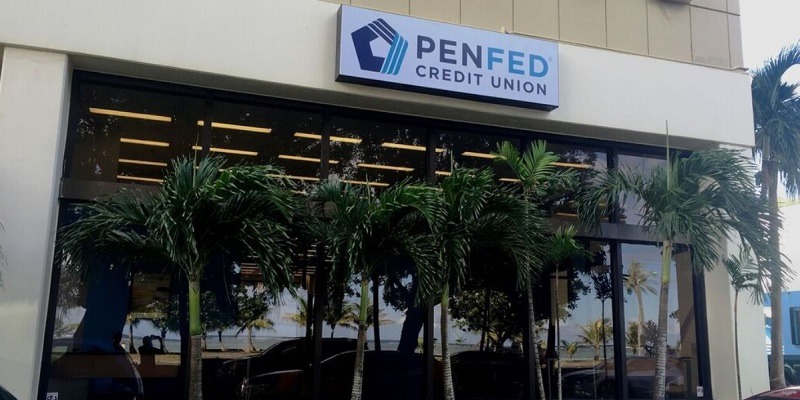Pentagon Federal Credit Union Reviews
ABOUT PENTAGON FEDERAL CREDIT UNION
Pentagon Federal Credit Union (PenFed) is a not-for-profit organization offering a variety of financial products and services, such as checking and savings accounts, credit cards, loans, and investment options. Known for its lower fees and competitive interest rates compared to traditional banks, PenFed is open to membership for everyone.
Pros & Cons
PROS
- Anyone can join
- Over 85,000 ATMs
- Low fees
- Competitive rates
CONS
- Must open savings account to establish membership
- Some minimums required to avoid fees
Featured Reviews


What is Pentagon Federal Credit Union?
Founded in 1935 and headquartered in McLean, Virginia, Pentagon Federal Credit Union (PenFed) serves over 2 million members worldwide and manages assets exceeding $36 billion.
PenFed offers a comprehensive range of financial products, including checking and savings accounts, certificates of deposit (CDs), credit cards, personal loans, auto loans, mortgages, and home equity loans. Additionally, PenFed provides investment services and insurance products.
Customers of PenFed benefit from access to more than 85,000 ATMs nationwide through the CO-OP and Allpoint ATM networks.
How does Pentagon Federal Credit Union work?
Anyone can join PenFed by opening a Regular Share or Premium Online Savings account with a minimum deposit of $5.
Once your account is established, you can access a wide range of financial products and services, such as checking accounts, credit cards, loans, and more.
As a not-for-profit organization, PenFed returns its profits to members through lower fees and better interest rates. Generally, PenFed offers more favorable terms than most traditional banks, though some accounts may require a minimum balance or direct deposit to avoid monthly fees.
Pentagon Federal Credit Union fees
Overall, PenFed has fewer fees than most traditional banks. Most of its checking and savings accounts are free. The Access America Checking account has a $10 fee, which is waived with at least $500 in monthly direct deposits or a minimum daily balance of $500.
Non-network ATM fees are waived for checking account customers. Other customers are charged $1.50 per withdrawal at non-network ATMs.
PenFed also charges the following fees:
- $30 for non-sufficient funds or overdrafts
- $20 for stop payments
- $1 for balance inquiries at non-network ATMs
- Up to 2% for international transactions
Is Pentagon Federal Credit Union legit?
PenFed is a reputable financial institution with membership open to everyone, not just those with military ties.
PenFed offers checking and savings accounts that are either free or have low minimum balance requirements, making them ideal for those looking to avoid high bank fees. However, if you prefer frequent access to physical branches, PenFed might not be the best choice, as it has a limited number of brick-and-mortar locations.
PenFed, or Pentagon Federal Credit Union, is a not-for-profit financial institution that offers a range of products and services, including checking and savings accounts, credit cards, loans, and investment options. It was founded in 1935 and is headquartered in McLean, Virginia.
Membership at PenFed is open to everyone. You can join by opening a Regular Share or Premium Online Savings account with a minimum deposit of $5.
PenFed offers a variety of accounts, including:
Checking accounts
Savings accounts
Certificates of Deposit (CDs)
Money market accounts*
PenFed provides several loan options, such as:
Personal loans
Auto loans
Mortgages
Home equity loans
PenFed generally has lower fees than most traditional banks. Many checking and savings accounts are free, but some accounts may have fees or minimum balance requirements to avoid fees. Specific fees include:
$10 monthly fee for Access America Checking, waived with $500 in monthly direct deposits or a $500 minimum daily balance
$30 for non-sufficient funds or overdrafts
$20 for stop payments
$1.50 for non-network ATM withdrawals
$1 for balance inquiries at non-network ATMs
Up to 2% for international transactions


